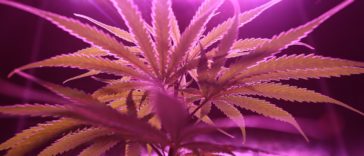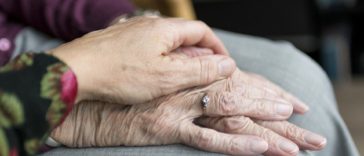This website is informational and cannot diagnose or treat illness or disease. Medical marijuana should be used under the direction of a licensed healthcare provider. This site contains advertisements. If you click a link and make a purchase, MarijuanaMommy.com may receive a commission.
I was interviewed by Maxwell Davis from GreenSea Distribution. Here’s the interview in its entirety, courtesy of GreenSea Distribution.
Not everyone in the cannabis industry can be considered your typical stoner. That is the case for our next guest, a single-mother who worked her way through nursing school to become a hospice nurse. Now, Jessie Gill works as a cannabis writer, activist and medical professional. What marked the transition? Well, as we’ve all experienced, life often times thrusts us into unexpected situations leading to unpredicted outcomes. Jessie’s story is no different. Her transition from a from an anti-cannabis mother to a full-on medical cannabis user is as powerful as it must of have been painful. Today, she shares her story and tells us what exactly changed her mind regarding cannabis as a medicinal treatment and the role it plays in our daily lives.
Written by Maxwell Davis & Jessie Gill
Edited by Maxwell Davis & Jon Russell
Maxwell Davis, GreenSea Distribution: Jessie, I appreciate you taking the time to speak with me today. All of us at GreenSea are excited to hear from you! For those who maybe unfamiliar with you or your writing, would you briefly introduce yourself?
Jessie Gill, The Marijuana Mommy: Hi Maxwell, thank you so much for having me. I’m a cannabis nurse and writer. I’ve been on Viceland and I’ve written for publications like Cosmopolitan and GoodHousekeeping. I also maintain a website, MarijuanaMommy.com that seeks to blur the lines and challenge stigmas while educating about cannabis.
Maxwell Davis: Sounds like you’re staying pretty busy! Well, again, I appreciate you joining me on this week’s Talking Shop and thank you for introducing yourself. Now, let’s jump right into this! Tell me about your life before cannabis.
Jessie Gill: Before cannabis, I was a hospice nurse. Every day I held the hands of the dying. It was hard and sad sometimes, but I loved it. It was an incredible vocation and left a really powerful mark on my life.
Maxwell Davis: Then something happened that would change your life forever. If you don’t mind opening up, what happened?
Jessie Gill: It was a random freak accident. It’s kind of hard to explain. A co-worker made a mistake and it resulted in me kind of being pushed, pulled and thrown. It resulted in damage to my cervical spine, my right shoulder and lots of nerve damage. I knew right away there was a problem and I went directly to the workman’s comp clinic.In the blink of an eye, I lost my vocation. But at the time, I didn’t realize how serious the injury was. I thought it was temporary. I was in good physical shape, and I was motivated to get better. I was certain I’d heal quickly and have my life back soon.
Maxwell Davis: That sounds as random as it does horrific. Where in your recovery journey did you find cannabis?
Jessie Gill: I still suffer from a great deal of chronic pain and some dysfunction of my neck and right arm. I exhausted all possibilities before I considered cannabis. In the beginning, it never even crossed my mind. Medical marijuana (MMJ) is extremely limited in New Jersey. I saw so many doctors and tried so many dangerous medications and not one doctor ever mentioned MMJ. They just doled out bottles of opiates and benzos and sent me on my way. I tried everything traditional medicine and complementary medicine offered. Often paying out of pocket, because the workman’s compensation system in NJ is horrific. I went to countless physical therapists and acupuncturists, I had loads of injections and tried so many different pharmaceuticals (with awful side effects). I finally had a multi-level cervical spinal fusion, but the surgery only made me worse. My neck mobility decreased and I lost the ability to drive.
Maxwell Davis: That is an awful experience. I’m sorry you had to go through all of that. What was the moment where you gave in and decided to try it? Were you initially hesitant?
Jessie Gill: Yes, I was resistant, but also desperate. The workman’s comp doctors had literally given up on me and closed my case. They told me that they’d done all they could and would not allow anymore treatment. I had no idea what I was going to do. I was a single mom with two kids, unable to work and suffering immensely. I was taking so many nasty medications – Lyrica, opiates, and benzos around the clock to manage the pain and muscle spasms. On top of those, I had to take additional medications to manage the side effects of the first ones. Even with all those pharmaceuticals, there were days when I couldn’t lift my head off the pillow because of the pain. And the side-effects from the meds made life unpleasant. I was so depressed.
Maxwell Davis: Now, you are an avid medical cannabis user. When did you decide cannabis was for you and why?
Jessie Gill: A friend suggested I try it. He used it for a similar injury and managed to ditch all his medications. I thought he was bonkers. I thought my condition was too serious to be helped by something so silly. I was very reluctant. My mom actually convinced me to try it. She said, “You’ve tried everything else. How can you not try this?” So after going through NJ’s ridiculous months-long process, I finally tried medical marijuana.
Maxwell Davis: Had you ever smoked prior to your accident? Were you nervous the first time you did it or did you enjoy the feeling?
Jessie Gill: There was a point in my younger life where I smoked marijuana often, and I don’t have the best associations from that time period. So, I was very freaked out about trying medical cannabis. I also have PTSD and I worried cannabis would trigger my anxiety or a panic attack. I had no idea then that marijuana can be an amazing treatment for PTSD. The first time I tried medical marijuana was eye opening. Immediately all my muscles relaxed and I felt like myself again for a little while. I stopped taking all the opiates and benzos immediately and after a few months I managed to get rid of Lyrica as well. But I am still prone to anxiety, there are some strains I can’t tolerate and I’m ultra-careful not to over-consume.
Maxwell Davis: That makes sense. Even as an avid cannabis user myself, I still can’t handle strains like Green Crack without experiencing what feels like a panic attack. As a former hospice nurse, if you could go back in time, would you recommend cannabis to any of your former patients? Why would you, or why would you not, recommend cannabis to those suffering to the point they need a hospice nurse?
Jessie Gill: Yes. Yes. Yes! When I was a hospice nurse, we kept emergency medication kits for each patient. That way if a patient needed morphine in the middle of the night, we had it on hand. Each of these kits contained dangerous medications like morphine and Ativan. If I could, I’d make cannabis a standard addition to all hospice emergency kits. There’s often a lot of suffering at the end of life. 90% of my patients were on morphine. These are the last moments that a human is here on this planet, the last moments families have to say good bye. I just don’t understand why are we are still drugging patients to sleep, when we have a medicine that can ease pain and allow patients to enjoy their final days. It’s criminal that hospice patients aren’t receiving this medicine routinely. Not to say there isn’t a place for morphine and traditional medications. In many situations, pharmaceuticals are necessary, but for a lot of patients there’s a better alternative that we’re not allowed to use.
Maxwell Davis: That was my thought too. It’s fascinating to hear someone with actual hospice experience saying the same. Now, tell me about using medical cannabis as a single-mother. How has it affected your time with your kids?Jessie Gill: Cannabis has been massively beneficial to my parenting. I’m not laid up in bed nearly as often. When I was living on opiates and benzos, I felt like I was just moving through the motions of life. I was severely depressed and just existing. Doing simple things like going to the part was torturous. With cannabis, I’m living again. I go to the park because I enjoy it. I can appreciate the sun on my face and the laughter of my kids because the pain is better controlled. And sure, I’m still always at risk for a massive nerve pain attack at any moment, but now I have a medication that provides relief fast. Of course, cannabis is limiting in some ways too. My son plays travel hockey, and I can’t leave the state with my medication. The travel restrictions suck. A lot.
Maxwell Davis: Interesting. You have lived quite a life, full of up’s and down’s.
Jessie Gill: Ha – Fortunately, more ups than downs, but it’s definitely been a wild ride.
Maxwell Davis: Now, let’s talk a little bit about your professional career. You’re a writer with a heavy focus on cannabis now, is that correct?
Jessie Gill: I am. Writing has always been my passion. Now cannabis is too. I strive to cipher all my energy directly into this cause.
Maxwell Davis: Who do you write for primarily? If I want to see the Marijuana Mommy in action, where would I go?
Jessie Gill: My home is MarijuanaMommy.com! But, I freelance for bunch of publications. I really enjoy working with Tonic, VICE’s health vertical. Wherever I am, I link to it from my site. Right now, I’m focusing on building video content for MarijuanaMommy.com.
Maxwell Davis: That’s awesome! What are some of your favorite subjects to write about in the cannabis world and why?
Jessie Gill: I’m passionate about spreading the truth – there are incredible, amazing benefits from cannabis, but it’s also important to address the real risks and side-effects too. There’s so much confusion and misinformation out there. Too many people still believe silly myths.I love challenging the stigma and anything that opens people’s minds.
Maxwell Davis: That makes total sense. So, after becoming a patient, how did you wind up actually working in cannabis? Are you happy to be in the industry?
Jessie Gill: I felt like I had to. I was shocked that I went through so much medical BS and not one medical professional ever mentioned marijuana. I knew there were others who’d relate. So, this bizarre confusing path really chose me.
Maxwell Davis: Phenomenal! Lastly Jessie, I wanted to ask you what would you say to others in chronic pain in regards to cannabis? I have a grandmother who refuses to try it based on her doctor’s orders. She’s also had issues with a drug addict personally related to her and sees cannabis much as a gateway drug. What would you say to her to get her to give it a shot if you two ever met?
Jessie Gill: Sadly, that’s the case for so many patients, especially from older generations. I would try to find other patients she can relate to – someone from her generation. A lot of cannabis communities have local advocates who are happy to share their experiences; or hook her up with YouTube videos of Sue Taylor. She’s an excellent advocate who often appeals to our older generations.
Maxwell Davis: That’s beautiful. Thank you so much for your time with me today, Jessie. I hope sharing your story inspires others to be more open-minded and do the same. I truly appreciate you coming on and speaking with us today.
Jessie Gill: Thank you, Maxwell, for the opportunity to share it. I’m truly grateful.
Maxwell Davis: Thanks again, Jessie. Have a wonderful day.
Jessie Gill: Make it amazing!
Trending Now









